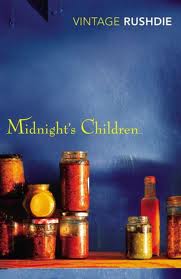Bedazzled; bemused; baffled: reading Salman Rushdie's 1981 Man Booker Prize wining novel Midnight's  Children is a roller coaster experience. It's a novel on a grand scale both physically (weighing in at more than 600 pages) and thematically; covering more than 60 years in the turbulent history of India and Pakistan. It demands a great deal from the reader with its abrupt and extreme changes in narrative flow, its multiple digressions and contradictions, its 100 or so characters and a style that blends comedy with history; Christian with Islamic and Hindu references and almost an encylopaedia's worth of facts.
Children is a roller coaster experience. It's a novel on a grand scale both physically (weighing in at more than 600 pages) and thematically; covering more than 60 years in the turbulent history of India and Pakistan. It demands a great deal from the reader with its abrupt and extreme changes in narrative flow, its multiple digressions and contradictions, its 100 or so characters and a style that blends comedy with history; Christian with Islamic and Hindu references and almost an encylopaedia's worth of facts.
 Children is a roller coaster experience. It's a novel on a grand scale both physically (weighing in at more than 600 pages) and thematically; covering more than 60 years in the turbulent history of India and Pakistan. It demands a great deal from the reader with its abrupt and extreme changes in narrative flow, its multiple digressions and contradictions, its 100 or so characters and a style that blends comedy with history; Christian with Islamic and Hindu references and almost an encylopaedia's worth of facts.
Children is a roller coaster experience. It's a novel on a grand scale both physically (weighing in at more than 600 pages) and thematically; covering more than 60 years in the turbulent history of India and Pakistan. It demands a great deal from the reader with its abrupt and extreme changes in narrative flow, its multiple digressions and contradictions, its 100 or so characters and a style that blends comedy with history; Christian with Islamic and Hindu references and almost an encylopaedia's worth of facts.
In essence the novel is the life story of Saleem Sinai, a child born on the stroke of midnight, at the exact moment that the newly independent state of India comes into being. He and the 500 plus other children born at the same time, enter the world with unusual powers — in his case psychic and olfactory powers — that create a mystical bond between them. Under Saleem's instigation the children unite in a Midnight Conference during which they telepathically discuss options for their country's future governance. Saleem believes his destiny is inextricably linked with that of India or, as he puts it:
I had been mysteriously handcuffed to history, my destinies indissolubly chained to those of my country.
Every twist and turn in India's history he therefore reads in terms of his the vagaries of his own life and the fortunes and misfortunes of his family. A bomb raid by Pakistan on Bombay he sees as a deliberate attempt to wipe out his entire family while Indira Gandhi's repression and round up of undesirables, he re-interpretes as a systematic campaign to eradicate all the Midnight's Children who are viewed as de-stablising forces in society.
But there is a huge gulf between the expectations he believes are placed on his shoulders as the first child of a new nation, and the reality of his life. He is acutely aware of this gulf even at a young age.
Already at the age of nearly nine, I knew this much: everybody was waiting for me ... had created around me a glowing and inescapable mist of expectancy...... I became afraid that everyone was wrong - that my much-trumpeted existence might turn out to be acutely useless, void and without the shred of a purpose.
As unreliable as Saleem proves to be as a historian, we still warm to this man labouring with the burden of history on his shoulders as well as multiple nicknames that draw attention to his enormous nose (Snotnose and Sniffer are just two of his sobriquets). Impossible too not to be bemused at the bizarre nature of some sections (an arch enemy who kills people by squeezing them with his knees; a married couple who live secretly in a cellar of a house, entering and exiting through a trapdoor). And equally impossible not to admire Rushdie's creative imagination or the vividness of his writing.
Despite all of those factors, I still did not enjoy reading Midnight's Children. The moments of pleasure were sadly too few to outweigh the times when I felt I was ploughing my way through the reading equivalent of treacle. Too much detail (particularly towards the end when Saleem is fighting a war in Pakistan), too many different allusions to keep track of and too many twists and turns. So I admire the ingenuity and appreciate how Rushdie pushed the boundaries of literature but ultimately I was bored.
It happens that sometimes the much talked about books are not what we enjoy reading. It's a pity that we read it, nevertheless, because we want to find out for ourselves as I'm preparing to read it in 2013.
ReplyDeleteI definitely appreciate your take on it and will keep it in mind when I tackle the book hopefully this year. Thanks for your great review!
ReplyDelete